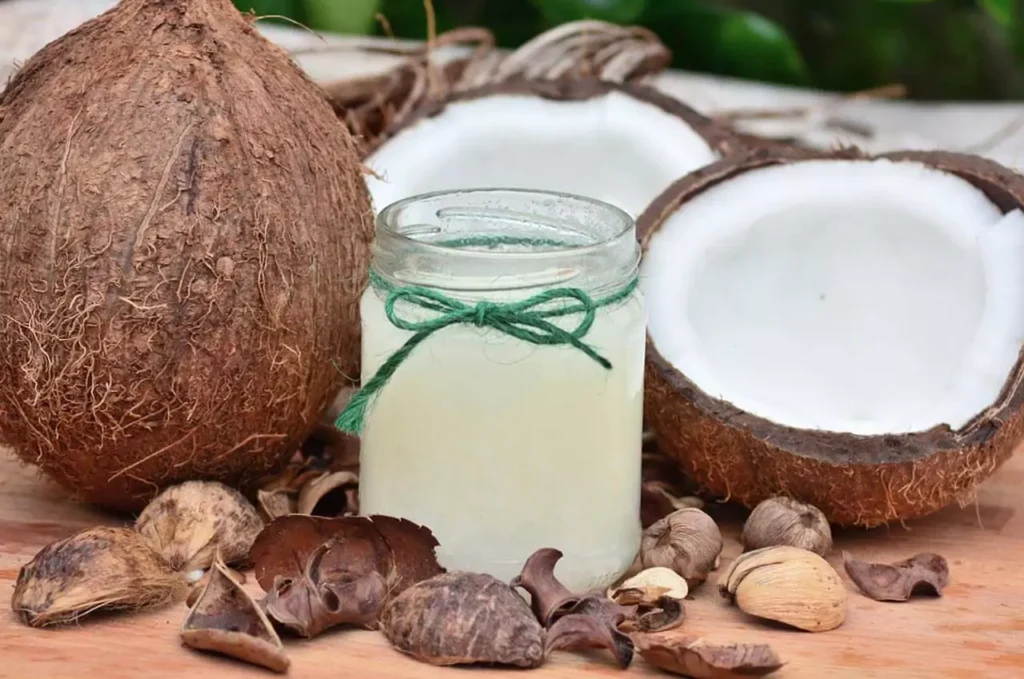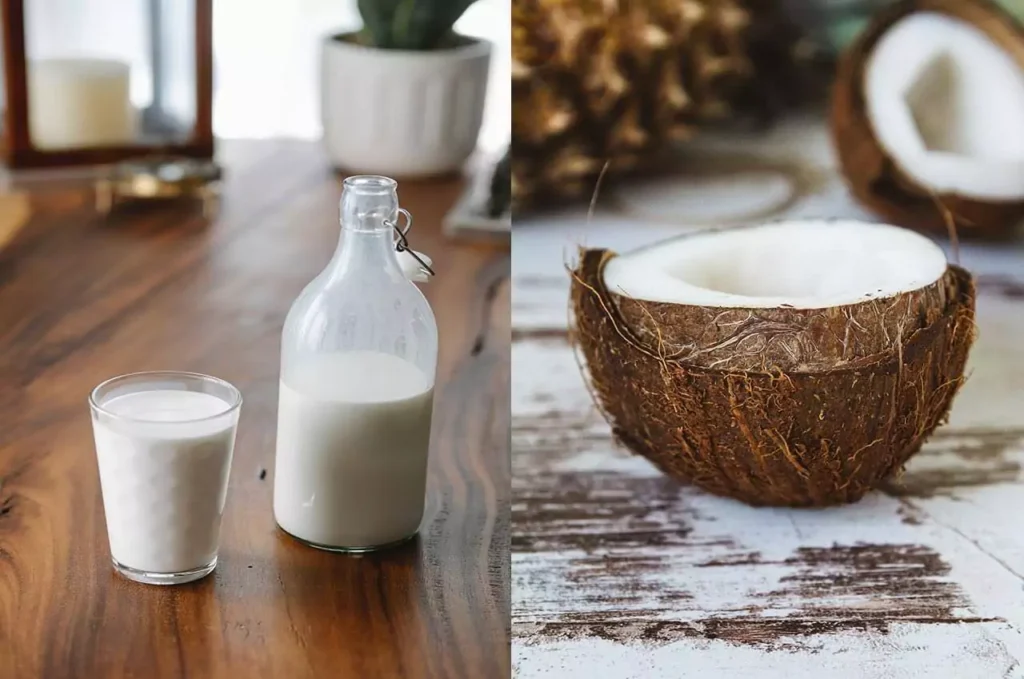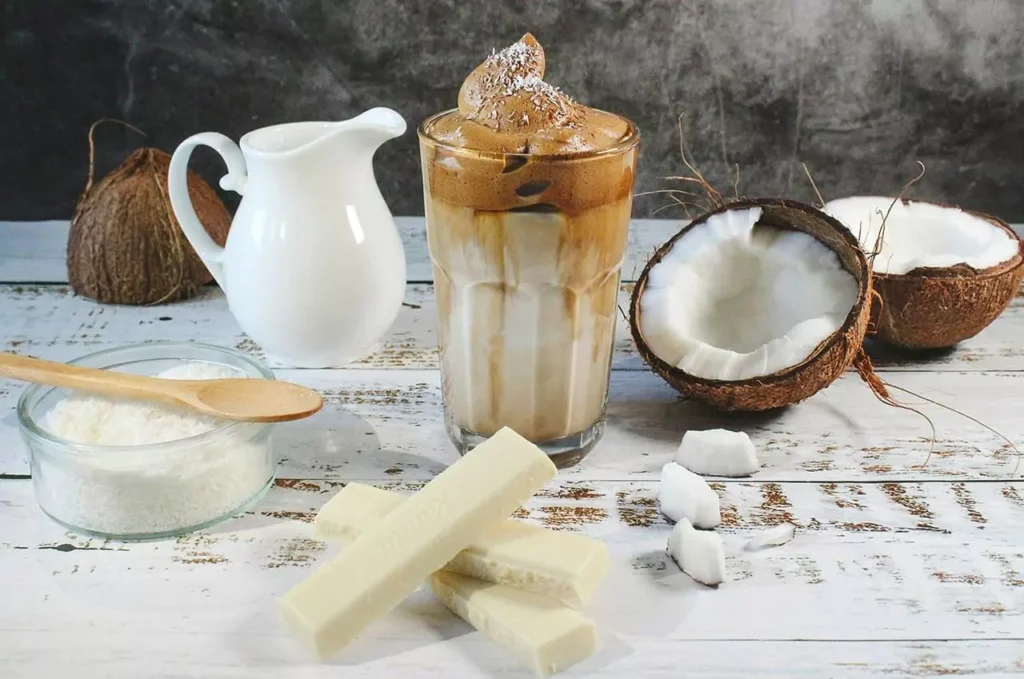If you also want to know about the benefits of drinking coconut milk Daily, then in this blog post we have given you complete information about what are the benefits of drinking coconut milk Daily and what are its side effects or risks.
Table of Contents
Introduction

Coconut milk is a creamy, nutrient-rich liquid that is extracted from the grated pulp of a mature coconut. Known for its distinctive tropical flavor, it has become a staple of various cuisines around the world. To prepare coconut milk, grated coconut is soaked in water, and then the mixture is strained to extract the milky liquid.
This dairy-free option is not only prized for its culinary use, adding depth to both sweet and savory dishes, but it also has myriad health benefits. From being rich in essential vitamins and minerals to its potential role in supporting heart health, coconut milk is a versatile and nutritious addition to a balanced diet.
In the pursuit of a healthy lifestyle, an increasing number of people are looking for natural alternatives to improve their daily habits. Among these, coconut milk emerges as a rising star. Rich in essential nutrients and with a distinctive taste, adding coconut milk to your everyday routine is likely to have a lot of benefits for your overall health. This versatile elixir not only enhances culinary experiences but also acts as a powerhouse of goodness, promising to contribute positively to your health journey.
10 Amazing Health Benefits of Drinking Coconut Milk Daily

1. Healthy Fats for Sustained Energy
Rich in healthy fats, coconut milk works as a powerhouse for sustained energy throughout the day. The medium-chain triglycerides (MCTs) found in coconut milk are easily metabolized by the body, providing a quick and efficient source of fuel. Unlike other sources of fat, MCTs are known for their ability to be rapidly converted into energy, making coconut milk an excellent choice for a natural and lasting energy boost. Whether added to your morning coffee or incorporated into recipes, coconut milk contains healthy fats that can contribute to a steady source of sustained vitality and energy.
2. Supports Weight Management
Coconut milk proves to be a valuable ally in maintaining a balanced lifestyle. Its unique composition of medium-chain triglycerides (MCTs) not only provides a quick source of energy but also boosts metabolism. The satiating properties of coconut milk contribute to a feeling of satiety, potentially reducing total calorie intake. By incorporating this versatile ingredient into your daily routine, you may find it to be a delicious and beneficial addition to your efforts to manage and maintain a healthy weight.
3. Nutrient Powerhouse
Coconut milk emerges as a nutritional powerhouse, containing abundant amounts of essential vitamins and minerals. From vitamins C, E and B-complex to minerals like magnesium, phosphorus and potassium, it provides holistic nutrition. This creamy nectar is not just a culinary delight. It is a nutritious addition to your daily routine. With each sip, you not only enjoy its distinctive taste but also provide your body with the goodness it craves. Boost your nutrition effortlessly as coconut milk becomes the cornerstone of your overall health and well-being.
4. Heart Health Benefits of Coconut Milk
Coconut milk stands as a silent ally in promoting cardiovascular health. Its creamy texture is very beneficial for heart health. Rich in medium-chain triglycerides (MCTs), coconut milk can help manage cholesterol levels, promoting a heart-friendly environment. Its lactose-free nature adds to its appeal and provides a tasty option without compromising on taste. By adding coconut milk to your daily routine, you not only enjoy culinary delights but also nourish your heart health, making it an essential addition for heart health seekers.
5. Digestive Health Benefits of Coconut Milk
Coconut milk provides remarkable digestive health benefits that contribute to overall well-being. Its soothing properties help ease digestive discomfort, making it a good choice for people with sensitive stomachs. The medium-chain fatty acids in coconut milk aid in the absorption of nutrients and promote a healthy gut environment. Additionally, coconut milk is lactose free, making it an excellent choice for people with lactose intolerance. Regular consumption of coconut milk can reduce digestive problems, providing a delicious and nutritious inclusion in your daily routine while supporting harmonious balance in your digestive system.
Also Read: 10 Powerful Benefits of Coconut Milk for Skin Care
6. Lactose-Free Milk Alternative
For those looking for lactose-free milk alternatives, coconut milk emerges as a delicious solution. Its creamy texture and rich flavor make it a satisfying alternative to traditional dairy for individuals with lactose intolerance or choosing a dairy-free lifestyle. Apart from its taste, coconut milk offers a nutritional edge, providing essential vitamins and minerals. This lactose-free gem not only opens up new possibilities for culinary enjoyment, but also ensures that everyone, regardless of lactose sensitivity, can enjoy the wholesome goodness of a dairy-free beverage that contributes to overall well-being.
7. Bone Health Booster
Coconut milk emerges as a bone health enhancer, providing a rich source of essential minerals like calcium and phosphorus. These minerals play an important role in strengthening bones and teeth, promoting overall skeletal strength. Regular consumption of coconut milk may contribute to preventing bone-related problems and maintaining optimal bone density. The synergy of nutrients within this creamy elixir makes it a delicious and nutritious addition to your daily routine, providing a way to naturally support the foundation of your body your bones.
8. Skin Nourishment and Glow
Regular consumption of coconut milk contributes significantly to skin nourishment and glow. Rich in vitamins and antioxidants, this creamy elixir becomes a beauty enhancer from within. The nutrients present in coconut milk play a vital role in promoting skin health, helping to maintain a natural, radiant glow. By incorporating this nourishing ingredient into your daily routine, you provide your skin with the essential elements it needs, laying the foundation for a healthier and more radiant complexion. Effortlessly upgrade your skin care with the nourishing power of coconut milk.
9. Balances Blood Sugar Levels
Balancing blood sugar levels is a paramount benefit of including coconut milk in your daily routine. The medium-chain fatty acids found in coconut milk are known to have positive effects on insulin sensitivity, aiding in better blood sugar regulation. This may be especially beneficial for individuals with diabetes or those aiming to maintain steady energy levels throughout the day. By including coconut milk in your diet, you may experience a more stable blood sugar profile, reduce the risk of spikes and crashes, and promote an overall sense of well-being.
10. Boosts Immune Function
Daily consumption of coconut milk can be a powerful ally in supporting your immune system. Rich in antiviral and antibacterial properties, coconut milk acts as a shield, strengthening your body’s defenses. The unique combination of nutrients and antioxidants contributes to a stronger immune response, helping your body fight diseases more effectively. By adding this creamy nectar to your daily routine, you not only enjoy its delicious taste, but also provide your immune system with the essential tools it needs, ensuring that you remain resilient in the face of health challenges.
How to Make Coconut Milk at Home

Coconut milk, with its rich and creamy texture, is not only a versatile ingredient in various culinary recipes, but it is also surprisingly easy to make at home. By preparing your own coconut milk, you can enjoy pure, unadulterated goodness without any additives. Let us know this simple but beneficial way of making coconut milk at home.
- 1. You’ll need a mature coconut, which is typically brown and has a hard shell. Ensure your blender is clean and ready for action.
- 2. Crack the coconut carefully. After opening it, take out the white coconut from the shell. Use a knife or coconut tool to separate from the shell.
- 3. Cut the white part of coconut into small pieces. This makes it easier to mix and express the milk.
- 4. Put the chopped coconut pieces in a blender and add water. The water-coconut ratio will depend on your desired thickness. For a standard ratio, try 1 cup coconut pieces and 2 cups water.
- 5. Mix the mixture on high speed until it becomes a smooth liquid. The goal is to get as much flavor and richness as possible from the coconut pieces.
- 6. To get silky-smooth coconut milk, strain the blended mixture. Use cheesecloth or a nut milk bag over a bowl to separate the liquid from the coconut pulp. Squeeze or press to remove as much liquid as possible.
- 7. Once strained, you will have pure, homemade coconut milk in the bowl. Place it in a clean, airtight container for storage.
- 8. For a sweeter version, add a natural sweetener like honey or agave syrup to taste. Stir gently to incorporate it.
- 9. Keep your homemade coconut milk in the refrigerator. It’s best to consume it within a few days, so consider making small batches based on your usage.
- 10. Shake your coconut milk well before using it. Homemade coconut milk may separate over time, but a quick stir will return it to its creamy consistency.
- 11. Don’t throw away leftover coconut pulp! You can repurpose it in recipes like coconut flour or add it to smoothies for an extra nutritional boost.
How to Store Coconut Milk at home

To maintain the freshness and quality of coconut milk, it is important to store it properly at home. Whether you’ve just opened a can of coconut milk or prepared it from scratch, here’s a guide on how to store coconut milk to ensure it remains safe before consumption. It should be safe for consumption and should also have a safe shelf life. Delicious taste remains intact.
1. Refrigeration: After opening the can or preparing fresh coconut milk, pour the unused portion into an airtight container. Refrigerate it immediately to slow the growth of bacteria.
Always check the expiration date on the can, and if you have made homemade coconut milk, label the container with the preparation date.
2. Airtight Container: Use clean, airtight containers made of glass or BPA-free plastic to store coconut milk. It helps prevent absorption of unwanted odor and maintains the quality of milk.
3. Isolation is normal: Coconut milk may naturally separate into a thick creamy layer and a watery layer. This is normal and does not indicate any malfunction. Shake or shake it well before use to mix the layers back together.
4. Disposal: If you don’t plan on using the coconut milk within a few days, consider freezing it. Pour the milk into ice cube trays or a large container, leaving room for expansion.
Once frozen, transfer the coconut milk cubes or blocks to a sealed freezer bag. This allows you to melt only the amount needed without compromising the entire batch.
5. Avoid Contamination: Always use clean utensils and avoid double-dipping to prevent contamination. This is especially important if you are drinking coconut milk straight from the container.
6. Checking Odor and Appearance: Before using stored coconut milk, give it a quick sniff. If it has an unpleasant odor, discard it. Additionally, check for any unusual changes in color or texture. Fresh coconut milk should have a uniform, white appearance.
7. Use within 4-7 days: For open cans or home-made coconut milk, it is recommended to use the contents within 4-7 days if stored in the refrigerator. After this time frame, quality may begin to decline.
8. Sealed Container: Unopened cans of coconut milk can be stored in a cool, dark pantry or cupboard. Make sure the cans remain sealed until you are ready to use them.
After opening, pour the remaining coconut milk into a container and follow the refrigeration guidelines mentioned earlier.
9. Temperature Considerations: Avoid storing coconut milk near heat sources or in areas with fluctuating temperatures. A cool and consistent storage environment helps maintain its quality.
10. Homemade Coconut Milk: If you have made coconut milk at home, be careful about the ingredients used. Fresh ingredients contribute to a shorter shelf life, so try to use homemade coconut milk within a few days.
By following these storage guidelines, you can ensure that your coconut milk remains safe for consumption and retains its rich flavor, making it a versatile and enjoyable addition to your culinary endeavors.
What are the Side Effects or Risks of Drinking Coconut Milk Daily?

While coconut milk offers many health benefits, it is important to be aware of the potential risks, especially for individuals with specific dietary considerations. Here are some potential risks associated with drinking coconut milk.
1. High Calorie Content: Coconut milk is rich in calories, especially from full fat. Excessive consumption without considering overall calorie intake may contribute to weight gain.
2. Saturated Fat Content: Coconut milk is high in saturated fat, which can increase cholesterol levels if consumed in excess. People with heart disease or high cholesterol should reduce their intake.
3. Allergy: Allergy to coconut is rare but can occur. People with tree nut allergies may also be sensitive to coconut. It is important to be cautious if you have known allergies.
4. Digestive Problems: Some individuals may experience digestive problems, such as bloating or diarrhea, when consuming coconut milk, especially if they are not accustomed to high-fat foods.
5. Added Sugar: Sweetened or flavored coconut milk products may contain added sugars, which can contribute to health problems like insulin resistance and weight gain if consumed excessively.
6. Possibility of Oxalates: Coconut milk contains oxalate, which when accumulated in the body can cause kidney stones. People suffering from kidney stones should reduce their intake of oxalate.
7. Not a Complete Protein Source: Coconut milk lacks some essential amino acids, making it an incomplete protein source. People who rely solely on a plant-based diet should make sure they get complete protein from other sources.
8. Interference with Medications: Coconut milk may interact with certain medications, especially medications that affect lipid metabolism. Individuals taking the medication should consult a health care professional before making significant dietary changes.
9. Environmental Impact: The production of coconut milk, especially if it is not obtained sustainably, can contribute to deforestation and environmental degradation in some areas.
10. Possibility of contaminants: Depending on the source and processing methods, coconut milk may contain contaminants or additives. Choosing high-quality, organic products can help reduce this risk.
11. Not suitable for babies: Coconut milk is not a suitable replacement for breast milk or formula for infants. It lacks essential nutrients for the development of the child.
12. Canned Coconut Milk Concerns: Some canned coconut milk products may contain BPA, a chemical found in some food packaging. This concern can be mitigated by choosing BPA-free packaging or fresh coconut milk.
Conclusion
The countless benefits of including coconut milk in your daily routine make it suitable for a balanced and health-conscious lifestyle. From aiding heart health to promoting glowing skin, coconut milk offers a myriad of benefits that can contribute to your overall well-being.
While coconut milk can be a delicious and nutritious addition to your diet, it is important to consume it in moderation and take personal health considerations into account. If you have specific health concerns or dietary restrictions, it is advisable to consult a health care professional or nutritionist. Ultimately, balance and awareness are key to enjoying the benefits of coconut milk while minimizing potential risks.
We hope that we have managed to answer the question “What are the Benefits of Drinking Coconut Milk Daily ?” in this blog post. Do you enjoy reading blog posts then we are sure you will be a fan of our next blog post. Please share it with your friends and family also.
FAQ Frequently Asked Questions
Q1. Is coconut milk a good dairy alternative for lactose intolerant individuals?
Ans: Yes, coconut milk is an excellent dairy-free alternative for those who are lactose intolerant. It is naturally lactose-free, making it a suitable option for individuals with lactose sensitivity or intolerance.
Q2. Can coconut milk be used in cooking and baking as a substitute for dairy milk?
Ans: Yes, Coconut milk is a versatile ingredient that can be used in cooking and baking. It adds a rich, slightly sweet flavor to both savory and sweet dishes. It’s commonly used in curries, soups, smoothies, and even desserts as a dairy milk substitute.
Q3. Does coconut milk contribute to weight loss due to its medium-chain triglycerides (MCTs)?
Ans: While some studies suggest that the MCTs in coconut milk may aid weight loss by increasing energy expenditure, it is important to consume it in moderation. Coconut milk is rich in calories, so it is important to include it in a balanced diet for those considering weight management.
Q4. Can coconut milk be beneficial for skin health?
Ans: Yes, coconut milk contains vitamins and antioxidants that may contribute to skin health. The fat in coconut milk may provide a moisturizing effect, and the antioxidants may help combat oxidative stress. Including coconut milk in your diet keeps the skin healthy.
Q5. Is coconut milk good for weight loss?
Ans: Yes, coconut milk can be beneficial for weight loss if consumed in limited quantities. It contains medium-chain triglycerides (MCTs) that may support metabolism and increase feelings of satiety. However, it is important to be mindful of the calorie content and include coconut milk in a balanced diet.
Q6. Is there a difference between canned and carton coconut milk?
Ans: Yes, there are differences. Canned coconut milk is often thick and rich, suitable for cooking and baking. Carton coconut milk found in the refrigerated section is more diluted and is a better choice for drinking or using in cereals and smoothies. Be sure to check the label for additives and choose the option that suits your preferences.